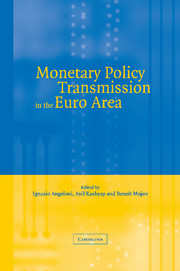 Monetary Policy Transmission in the Euro Area
Monetary Policy Transmission in the Euro Area Published online by Cambridge University Press: 22 September 2009
Introduction
This chapter investigates the existence of the bank-lending channel in the transmission of monetary policy using Portuguese micro bank data. In contrast to the conventional approach, which addresses the identification issue by resorting to reduced form equations for bank credit with variables in differences, we directly estimate loan-supply schedules with variables in levels, thereby exploiting recent results on cointegration for panel data.
The main conclusion is that there is a banking lending channel in the transmission of monetary policy in the Portuguese economy and that the importance of this channel is larger for the less capitalised banks. Size and liquidity do not appear to be relevant bank characteristics in determining the importance of the lending channel.
The remainder of the chapter is organised as follows. Section 2 briefly characterises the main changes undergone by the Portuguese banking sector during the 1980s and 1990s. Section 3 describes the new approach aimed at identifying and estimating the importance of the bank-lending channel. Section 4 reports the empirical results for Portugal and section 5 summarises the main conclusions.
Monetary policy and banking sector developments in Portugal during the 1990s
Since the early 1980s the Portuguese financial system underwent a fundamental liberalisation process beginning with the opening up of the banking sector to private initiative in 1983. In this period the first steps towards the elimination of the administrative controls on interest rates and credit growth were also taken.
To save this book to your Kindle, first ensure [email protected] is added to your Approved Personal Document E-mail List under your Personal Document Settings on the Manage Your Content and Devices page of your Amazon account. Then enter the ‘name’ part of your Kindle email address below. Find out more about saving to your Kindle.
Note you can select to save to either the @free.kindle.com or @kindle.com variations. ‘@free.kindle.com’ emails are free but can only be saved to your device when it is connected to wi-fi. ‘@kindle.com’ emails can be delivered even when you are not connected to wi-fi, but note that service fees apply.
Find out more about the Kindle Personal Document Service.
To save content items to your account, please confirm that you agree to abide by our usage policies. If this is the first time you use this feature, you will be asked to authorise Cambridge Core to connect with your account. Find out more about saving content to Dropbox.
To save content items to your account, please confirm that you agree to abide by our usage policies. If this is the first time you use this feature, you will be asked to authorise Cambridge Core to connect with your account. Find out more about saving content to Google Drive.